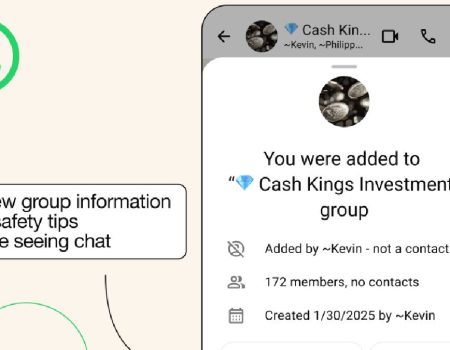In an intensified move to tackle the rising threat of online scams, WhatsApp has announced the rollout of new anti-fraud features and revealed that it banned more than 6.8 million accounts in the first half of 2025. According to the Meta-owned platform, these accounts were linked to global scam networks that are increasingly using advanced AI tools and multi-platform strategies to deceive users, especially those facing financial strain.
The banned accounts are reportedly tied to criminal fraud centres operating mainly out of Southeast Asia. These syndicates are known to run elaborate scams—from fake investments to pyramid schemes—that lure victims through emotionally appealing or financially enticing offers. Meta stated in a blog post that such schemes often start with innocuous-seeming messages and escalate quickly into data theft or monetary loss.
“We don’t just react to reported scams—we’re now proactively detecting and removing accounts before they become active,” WhatsApp stated in the blog.
A growing trend in these scams involves shifting users between different platforms—like dating apps, Telegram, and cryptocurrency exchanges—to obscure their fraudulent activity. This tactic makes it harder for any one service to detect the full scope of the scam.
One notable case involved collaboration between Meta, OpenAI, and WhatsApp to dismantle a scam operation based in Cambodia. In this instance, scammers used ChatGPT to craft convincing messages that led victims to WhatsApp conversations. From there, they were redirected to Telegram and asked to “like” TikTok videos for a small payment, which was part of a rent-a-scooter pyramid scheme. Victims were eventually coaxed into depositing funds into fraudulent cryptocurrency accounts, believing they were making legitimate investments.
To counter such sophisticated manipulation, WhatsApp is rolling out a series of user-facing safety tools. One new feature provides a comprehensive safety overview when a user is added to a group by someone not in their contacts. This includes clear group details, enabling users to exit the group without having to open it.
Another tool currently being tested warns users when initiating chats with people outside their contact list. WhatsApp will display additional context about the unknown number to help users decide whether it’s safe to proceed.
To further reinforce its safety push, Meta has partnered with cybersecurity expert Rachel Tobac to educate users on how to recognize red flags. “Pause, question, and verify” is her simple yet effective mantra for identifying potential scams. She urges users to be cautious of messages promising quick cash or claiming emergencies from people they don’t know well—and to always verify via known, secure channels.
“These scammers aren’t just annoying, they’re organised, relentless, and often tied to serious criminal operations, including forced labour,” Meta emphasized.
With these new tools and awareness efforts, WhatsApp aims to create a safer environment for its users and stay one step ahead of increasingly tech-savvy scam networks.








No Comment! Be the first one.